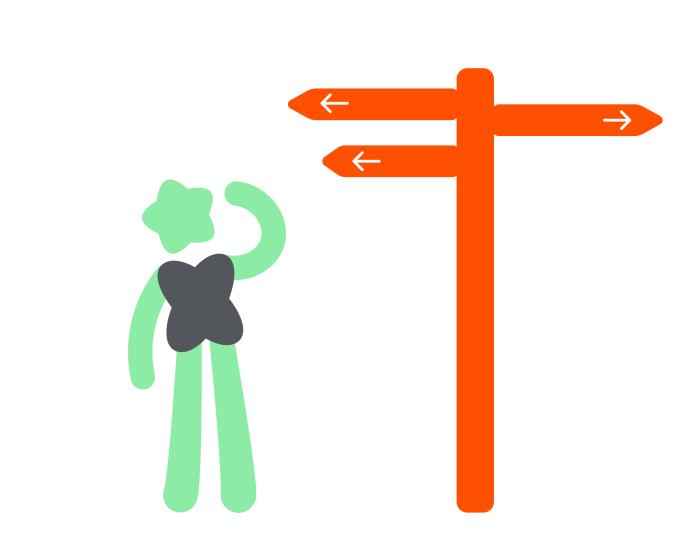Job hunting at different career stages

Every stage of the job search brings something new to learn and opportunities you might not have thought of before. On this page, you’ll find clear, situation-specific advice on everything from applying for a work placement or thesis position to changing your field entirely. By taking a moment to map out your own skills and goals, you will gain more confidence and direction in your job search. Keep reading for practical tips to help make your job search a little easier and much more effective.
Applying for a Work Placement or Thesis Position
Applying for a work placement or a thesis position gives you the chance to put your learning into practice and develop your expertise in your chosen field. The same job search skills apply in these situations: be clear about your goals, recognise your strengths, and apply actively for both advertised and hidden opportunities.
- Familiarise yourself with the instructions: Check the work placement and thesis requirements for your degree as well as the application guidelines so you know what is expected for the position.
- Make a plan: Think about which skills you want to strengthen and what kind of experience you are looking for. This helps you to write a personal application.
- Reach out confidently: Contact employers directly, even if no position has been advertised yet. Highlight your skills: practical projects, software, knowledge gained through your studies.
- Communicate your motivation clearly: Why are you applying for this particular position and why are you interested in this organisation?
- Schedule your job search: Good planning and an early start will make it easier to find a suitable position.
- Be ready to talk about your skills: Employers may not know the details of your degree, so describe your strengths and your timetable clearly and enthusiastically.
Looking for Your First Job
Your first job is the start of your career and creates a foundation for your professional growth. Many people wonder if they have enough to talk about in their background. You do! In addition to your studies and possible positions of trust, skills you have gained in other areas of life are also valued in working life.
- Focus on your skills, not just on work experience: In your CV, include courses, projects, group work, and your thesis that taught you practical abilities.
- List your IT and software skills: For example, Office programmes, analysis software, programming languages, design tools – anything that could be helpful at work.
- Use skills gained through hobbies: Mention things like working in a team, organising events, or maintaining a blog or video channel.
- Highlight volunteer work and positions of trust: For example, peer support activities at school, work for student organisations, volunteering, leading a club, or other community activities.
- Show your language skills and international experience: If you have studied abroad, travelled, worked in another country or participated in international projects, mention these.
- Think about what you learn in daily life: For example, looking after children, helping grandparents or running a household develops responsibility, organisational skills and flexibility.
- Be honest about your lack of experience, but highlight your eagerness to learn: Say in your application that you are looking for your first job, but emphasise your motivation to take on new challenges and learn quickly.
- Ask teachers or hobby instructors for references: If you have not had a paid job, a teacher, instructor or volunteer leader can act as your referee.
- Personalise your application for each job: Find out the employer’s expectations and adjust your CV and application to meet the needs of that specific job.
- Practise for job interviews: Ask a friend to ask you typical interview questions and think of your answers in advance.
- Use LinkedIn and other networks: Create or update your LinkedIn profile and let your contacts know you are looking for your first job.
- Be active – apply even for positions where you do not meet every requirement: Many employers are looking for a motivated person who is ready to learn on the job.
Job Search as a Recent Graduate
Graduation is an exciting milestone – a new stage in your career is beginning, even if everything does not yet feel familiar. Trust that your studies, projects, and work placements have given you valuable skills, which you can now describe to employers.
- Make your skills visible
List all the skills and achievements you have built up during your studies, work placements, and projects. All your experiences are valuable, even if they are not directly related to working life. - Recognise your strengths
Think about what you have succeeded in during your studies, what positive feedback you have received, and what feels right for you. Highlight these in your applications and interviews. - Use new tools for job searching
In addition to a traditional CV, consider preparing a portfolio, a video introduction or a LinkedIn profile. Concrete evidence, like GitHub links, portfolio websites or presentations of your thesis, will help you stand out. - Target your applications
In your application, highlight the specific skills and experience that are relevant for the employer and the job you are applying for. Cut unnecessary details and bring out the essential parts. - Tailor your CV as needed
You can make several versions of your CV if your skills allow you to apply for different roles. Always adapt your application to fit the open position. - Be honest and emphasise your ability to learn
Employers know you are not yet a finished expert. Show openly where you still need more learning and what you have already learned quickly. - Network confidently
Many jobs are filled through networks, so use the contacts that you made during your studies. Take part in alumni events, ask teachers for advice and keep in touch with work placement organisations. - Ask for feedback and develop continuously
If you do not get the job, do not give up – ask for feedback and update your application materials as you gain experience. Every application process is a step forward. - Show your attitude
You are ready to learn new things, full of enthusiasm and able to see things with fresh eyes. Tell this to employers and remember that your skills are valuable.
Job Search When Changing Careers
Changing your career field is a unique situation. It requires persistence as well as talking about your skills in a new way. You may have a strong background, but the challenge is to show how your previous skills transfer to your new field.
A career changer’s strengths are their mature attitude, versatile experience and proven courage to try something new. Bring these out in your job search and show your commitment to learning a new field. Every change moves your career forward, even if the path to a new job is a bit winding.
1.Recognise and describe your transferable skills:
Every field needs skills such as communication, project management, problem-solving, learning new things, and collaboration. Write down what kinds of skills you have developed in your previous career and how they apply in your new environment.
2. Emphasise your motivation and desire to learn:
A new field requires new learning – show concrete examples of how you have already explored your future field, through courses, volunteering, hobbies, or mentoring.
3. Build your own career change story:
Think and explain in your application (and possibly in your CV) why you want to change fields, what links you to your new area, and how your former path supports your transition. Honesty and justification boost your credibility.
4. Develop new skills in a planned way:
Add new skills, for example, through open university of applied sciences studies, MOOCs or short courses. This shows employers that you are committed and ready to develop.
5. Use your networks effectively:
Start networking already during your career change plans. Attend events, webinars and sector discussions, follow the field’s news and join social media groups.
Connecting directly with professionals in your future sector through LinkedIn may bring valuable tips – and sometimes even job opportunities.
6. Personalise your application for your situation:
Be honest that you are changing fields – summarise in your application which skills and experiences are especially useful for the role you are applying for. Tell the employer why your background would add value to their team.
7. Be patient in the change process:
Changing careers can take longer, and your first application may not lead directly to your dream job. Set realistic intermediate goals, such as work placements, fixed-term jobs or part-time work, if that brings you closer to your goal.

Job searching requires you to be active, patient and confident in making your skills visible in different situations. Whether you are applying for your first job, changing your career, or planning a work placement, your next step is often small but important. Think about what practical action you could take today:
- Update your CV and LinkedIn profile.
- Contact an employer who interests you.
- Apply for an open position or express your interest even if there are no vacancies at the moment.
- Book an appointment for career guidance and talk about your goals out loud.
- Ask a friend, teacher or coach for help or feedback.